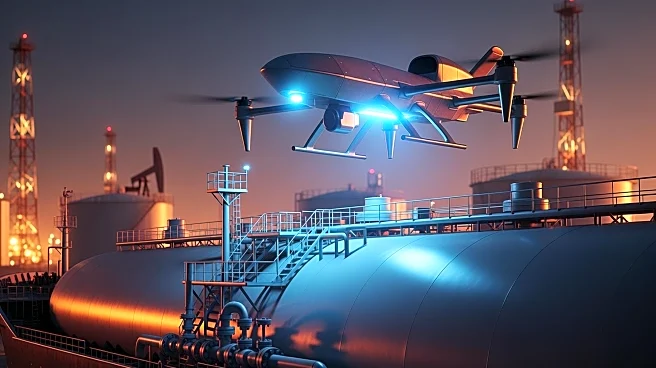What's Happening?
Ukrainian drone strikes have significantly impacted Russia's fuel exports, reducing them to their lowest levels since early 2022. According to Bloomberg, average daily exports fell to 1.88 million barrels
in the first 10 days of October. The strikes have affected more than 20 major refineries, leading to a total refining output below 5 million barrels per day. The Russian government has responded by banning gasoline exports to alleviate domestic shortages. Additionally, a strike in September damaged the Ust-Luga terminal, which handles a significant portion of Russia's naphtha exports, causing a 43% drop in shipments month-on-month.
Why It's Important?
The reduction in Russia's fuel exports due to Ukrainian drone strikes has significant implications for global energy markets. With Russia being a major player in the oil industry, disruptions in its supply can lead to increased volatility in oil prices worldwide. The domestic ban on gasoline exports indicates potential shortages within Russia, which could affect its economy and lead to increased domestic prices. Furthermore, the International Energy Agency has warned that Russian oil companies will continue to feel the effects of these attacks for nearly a year, impacting global supply chains and potentially leading to shifts in energy sourcing strategies.
What's Next?
The International Energy Agency projects that Russian refining output may not return to normal levels before June 2026. This prolonged disruption could lead to sustained changes in global oil supply dynamics, with countries potentially seeking alternative sources to mitigate risks associated with Russian supply. The ongoing geopolitical tensions between Russia and Ukraine may also influence future energy policies and international relations, as countries navigate the complexities of energy security and political alliances.
Beyond the Headlines
The drone strikes on Russian energy infrastructure highlight the evolving nature of warfare and its impact on critical industries. The use of drones in military operations underscores the need for enhanced security measures and technological advancements in defense systems. Additionally, the situation raises ethical and legal questions regarding the targeting of civilian infrastructure in conflict zones, potentially influencing international law and military strategies.









